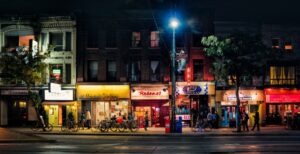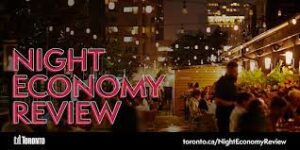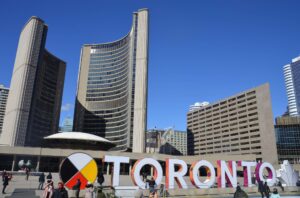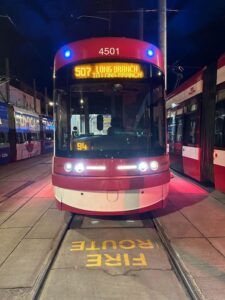
Long Branch and Dundas Strip proposed to be Night Time Economy or night club areas of Toronto with bars open 24 hours.
A plan by the City of Toronto to establish a ‘Night Time Economy’ in Long Branch and other areas to make it a night club area is sparking concerns in the community.
The plan has been in the works for years and will be debated before an Economic and Community Development Committee on November 28 and the Planning and Housing Committee on November 30.
A Night Time Economy will deem Long Branch and the Dundas Strip in Etobicoke, and other areas of Toronto to allow bars and live music clubs to remain open 24-hours.
Judy Gibson, of the Long Branch Neighbourhood Association, in an e-mail said there has been no local consultation to seek input into the matter.

City committees will rule if our by-laws are draconian and not up for modern times where people can party all night.
“There are no noise restrictions in place for this,” she wrote. “Not sure whose idea this was but we need to send a response to this.”
Gibson said it may not be a good idea for all-night clubs in the quiet community.
“Think about a night club operating with DJ’s light and music outside to all hours of the night on top of one of the newly constructed buildings on Lake Shore in a few years,” she wrote.
A letter is being drafted to send to the committees to outline the concerns of the community.
The city has sent an e-mail to update community groups on ‘licensing and zoning regulations for restaurants, bars and entertainment venues’ and in support of the Night Time Economy.
Three separate city staff reports are to be considered by the Economic and Community Development Committee and the Planning and Housing Committee.
The by-law amendments if approved are expected take effect on January 1.
The recommendations include the modernization of regulations for bars, restaurants, and entertainment venues, with the aims of reducing administrative burden on operators and providing flexibility for establishments.
They ensure an ‘appropriate level of regulatory oversight to mitigate community nuisance and public safety concerns.’
Bars with live music are expected to remain open longer, with more space for entertainment. The TTC is also expected to operate longer hoursand provide more frequent service for night-time patrons.

City officials said most of the night-life action are in downtown Toronto and want to see more nightlife in other areas, including Long Branch.
A consultation with clubs, local and diverse groups and those in the arts was held to seek input. The review involved local groups like Arts Etobicoke and the Lake Shore Village BIA.
A city report said the zoning by-law regime for bars, restaurants and entertainment venues originated in 1960s to the early 2000s and does not reflect ‘contemporary and forward focussed expectations around these activities and land uses.’
It stated the proposed amendments seek to support live music, align zoning and business licensing regulations, support emerging entertainment areas outside the downtown core, modernize licensing and zoning regulations for restaurants, bars and entertainment venues, and address impacts of problematic establishments.
City officials said most to the night-life now exists in downtown with less than 10 per cent taking place in outside areas like Etobicoke, Scarborough and North York.
Some Etobicoke participants said there are a very few options for nightlife and entertainment after 10 p.m.
“This participant needs to travel 15 minutes by car to reach nightlife options,” the review noted. “Etobicoke is missing walkable access to lounges, cafés, cultural spaces and other establishments.”
Another Etobicoke resident noted there is much high-density housing with a lack of nighttime or community spaces.
“We are swamped with more proposals for more towers, but nothing for cultural life, art, music.”
Some councillors said the Night Time Economy exists in Antwerp, Bangkok, Belfast, Berlin, Durban, Johannesburg, Mälmo, Montreal, New York, São Paulo, and Singapore.


